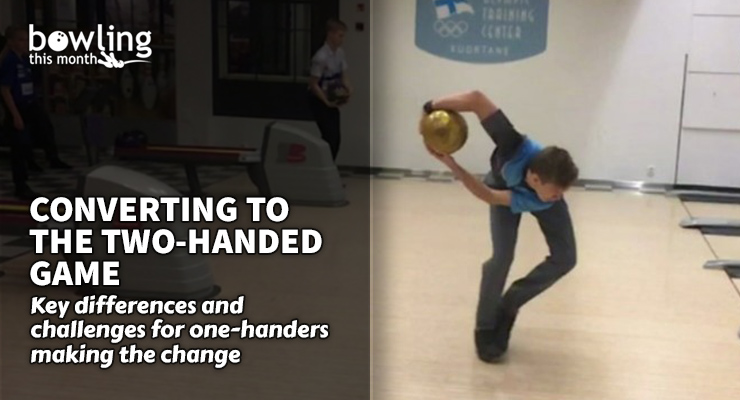Article Contents
- 1. The hips are key!
- 1.1. Differences in hip movement
- 1.2. Why do we see fewer female two-handers than male?
- 1.3. Checking hip mobility
- 2. Fundamental differences in the two-handed game
- 3. Swing differences
- 3.1. Proper swing technique
- 3.2. Swing distance
- 3.3. Timing and the shape of the swing start
- 3.4. A key factor in converting
- 4. Overall timing
- 4.1. Timing point one
- 4.2. Timing point two
- 4.3. Timing point three
- 5. Footwork
- 6. Release position
- 6.1. Vertical shoulder movement
- 6.2. Trailing foot and the release position
- 6.3. The sliding foot
- 7. Conclusion
Note: This article is only available to Bowling This Month subscribers.
It’s hard to disagree that the two-handed style is becoming the dominant method of bowling around the world. As more and more youth bowlers adopt this style, many bowlers who started as one-handers have considered the switch to two-handed bowling.
This article will examine some of the key differences and trouble spots that one-handers face when converting to the two-handed game.
The hips are key!
The first key area to examine is the hips. Two-handed bowling is much more dynamic and places a greater emphasis on mobility and rotation.
Think of bowlers like Andrew Anderson, Kris Prather, Francois Lavoie, Dasha Kovalova, and Diana Zavjalova. These are all examples of bowlers with the modern one-handed style. You can tell from those examples that it’s not just based on rev rate.
The simplest way to view it is in terms of body and hip rotation. If the bowler rotates the body and hips, they are modern-style bowlers. It should go without saying that all two-handers are naturally modern because of how much the body needs to rotate in this style.
This is a key requirement to use this style: horizontal hip rotation. Modern one-handers generally achieve about 30 to 45 degrees of hip rotation and about 45 to 60 degrees of shoulder rotation in the swing. Two-handers open their hips close to 60 degrees and their shoulders closer to 90 degrees.
If you’ve played with a classic style all your life, which uses even less movement and rotation than modern one-handed bowling, it’s a really big challenge to convert to the two-handed game. It’s a whole new library of movements to learn and for your body to do (if it is capable). Most often, you end up extremely rev-dominant with very little ball speed.
Differences in hip movement
Another key area related to hip movement is the timing. For many bowlers converting, they start opening their hips too early. One-handers open their hips in the third step (of a five-step approach, which we’ll use for reference throughout the article), but two-handers open during the fourth step when the bowler is ...
Already a premium member? Click here to log in.


